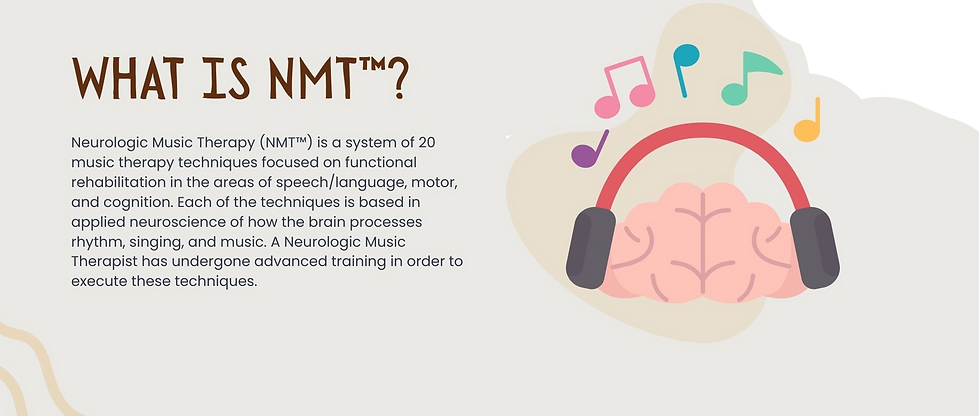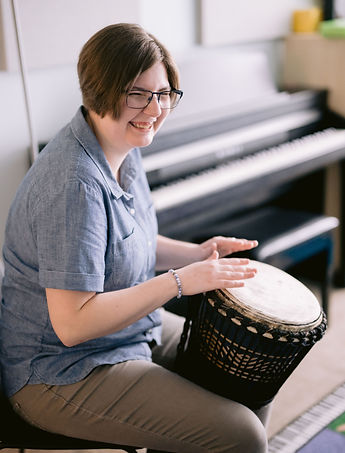Neurologic Music Therapy
Annapolis Music Therapy offers individual services through a music-centered, research-based system of techniques for adults experiencing neurologic disease or injury. Our certified Neurologic Music Therapist will use systematic techniques to foster rehabilitation in speech and language, motor, and cognitive domains.

Melodic Intonation Therapy (MIT™):
Uses melodic and rhythmic elements of singing to enhance speech in those experiencing expressive aphasia following a stroke or brain injury
TherapeuticInstrumental Music Performance (TIMP®):
Uses instrument playing to provide auditory and tactile feedback while completing exercises which target range of motion, endurance, strength, fine motor control, limb coordination, and more.
What does a NMT™ session look like?
Depending on your goals for rehabilitation, sessions may include playing instruments, singing or chanting, utilizing a metronome, creating songs, or moving to familiar music. Each client will have a customized treatment plan created by the Neurologic Music Therapist based on their specific needs and goals. No matter what technique is used, repetition will be a key component. Just like exercising at the gym, NMT™ requires repetition to train and strengthen both the body and the brain. Below are a few descriptions of NMT™ techniques.
Musical Neglect Training (MNT™):
Uses instrumental exercises, rhythmic and harmonic cues to target limbs affected by hemi-neglect (the body’s lack of awareness of one side of the body), often by crossing midline to play intentionally placed instruments.
Rhythmic Auditory Stimulation (RAS®):
Uses a steady beat through a metronome and/or live music to trigger the brain’s natural response to match the beat while walking (known as rhythmic entrainment). RAS® may also utilize other techniques to train pre-gait skills needed for walking such as balance, strength, and coordination.


Who could benefit from NMT?
NMT™ is most effective for those who have experienced neurological disease or injury. This includes Stroke, Traumatic Brain Injury (TBI), Spinal Cord Injury (SCI), Parkinson’s Disease (PD), and Multiple Sclerosis (MS). As NMT™ focuses specifically on functional goals, it is most beneficial for those experiencing the following symptoms or difficulties:

Speech & Language
Initiation of speech (including expressive aphasia)
Intelligibility and clarity
Rhythm and pacing
Respiratory support
Motor Skills & Sensory Integration
Gait (Walking)
Pre-Gait Skills such as balance, strength, coordination, or endurance
Fine motor skills in hands and fingers
Range of motion
Neglect of one side of the body (hemineglect) following a stroke
Cognitive Skills
Attention
Mental Endurance
Memory
Executive Functioning skills such as planning and problem solving
How is this different from regular music therapy?
When an individual with a neurological injury or disease seeks traditional music therapy, the goals are often focused within mental health and emotional skills such as coping, acceptance, and emotional expression. Within NMT™ sessions, the goals are centered on functional skills which improve daily life. In traditional music therapy, a stroke survivor singing may be an emotional release, while in Neurologic Music Therapy®, singing is often targeting the mechanisms behind speech in order to improve clarity or articulation in everyday life.




